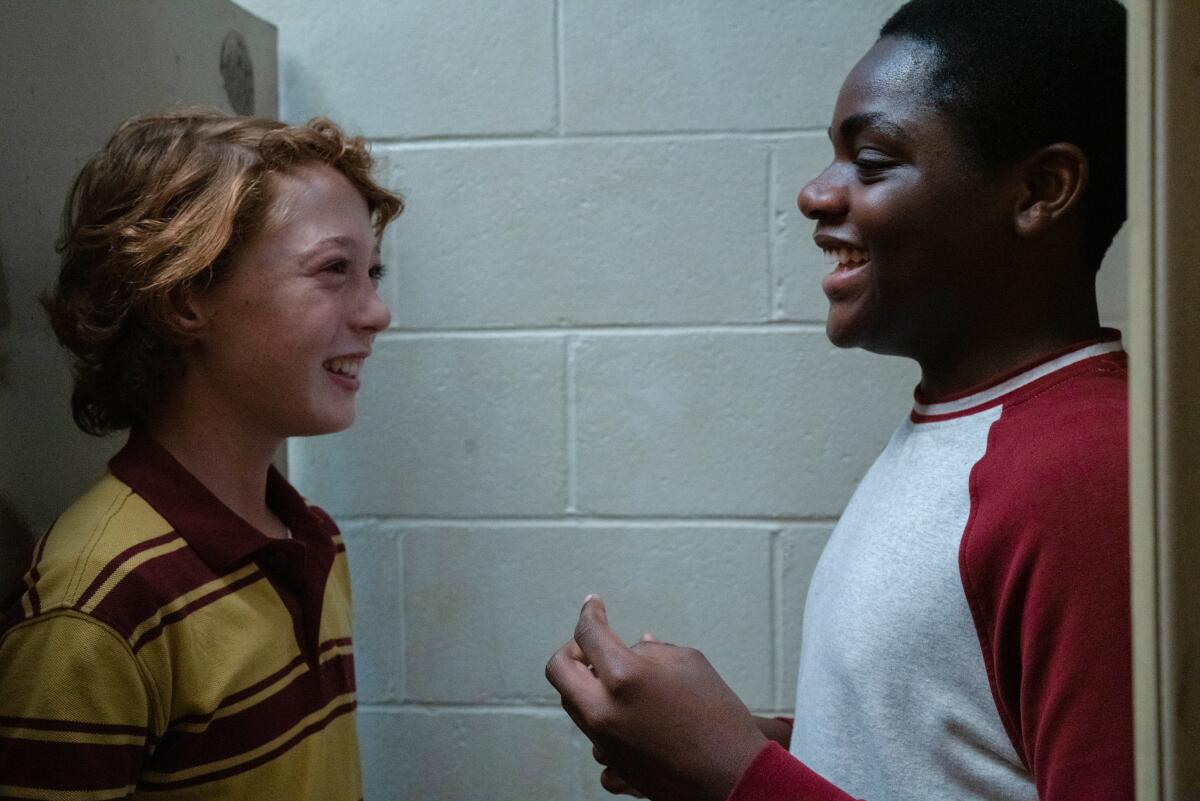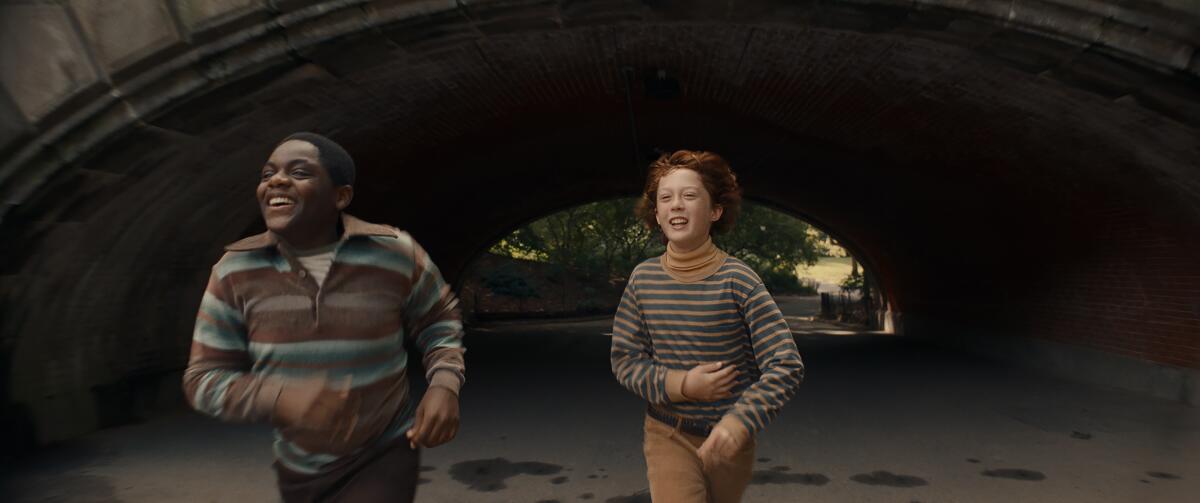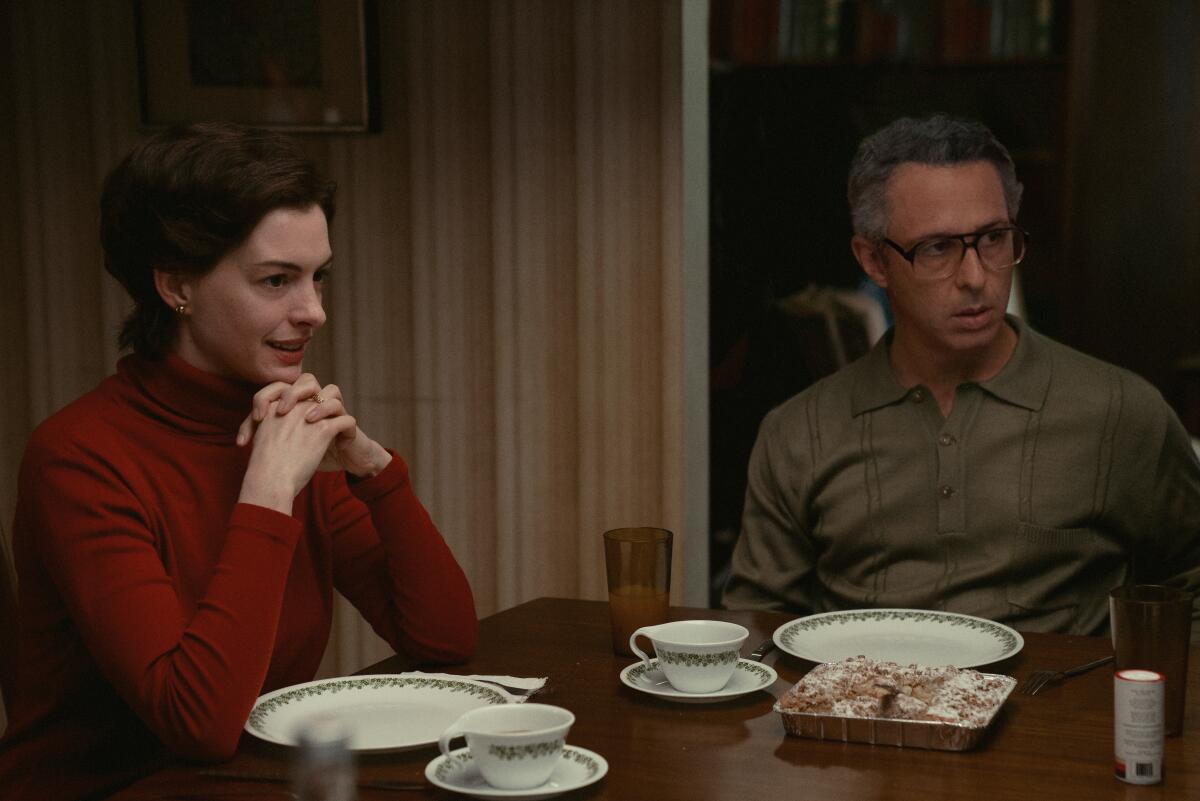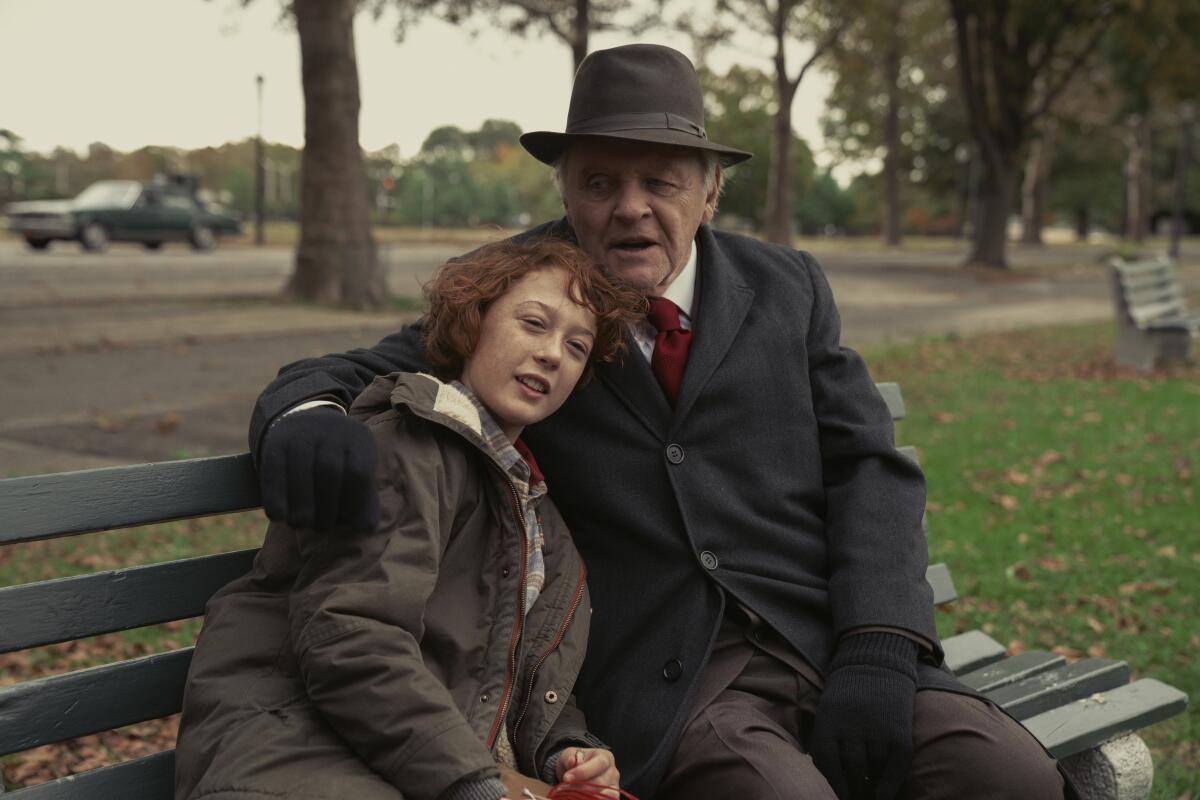In the wrenching ‘Armageddon Time,’ a filmmaker powerfully confronts his own privilege

- Share via
It’s fitting that “Armageddon Time,” James Gray’s quietly anguished movie about events from his own childhood, begins with a kid arriving at a school and ends with him departing another. In between those bookending images, 11-year-old Paul Graff (Banks Repeta) receives an education of a cruel and costly order, though he isn’t the one who ultimately bears the cost — or the cruelty. Set in Queens, N.Y., in the autumn of 1980, with an uneasy chill in the air and the first Reagan administration on the horizon, the film is an epic of boyhood disillusionment, what you might call a coming-of-rage story, in which Paul’s eyes are opened to the hard realities of systemic injustice and his own silent complicity.
That might make this movie, Gray’s eighth feature as a writer-director, sound like a predictable exercise in liberal hand-wringing — a chance to shake our heads at another ugly spectacle of American racism from a safe, sanctimonious distance. But if “Armageddon Time” seems to hew to a familiar playbook, it also avoids trafficking in the complacency, reassurance and false equivalencies that most Hollywood explorations of race and class are eager to peddle. It doesn’t evade every trap or trapping of convention, but its tenderness of touch is matched by a remarkable toughness of mind.
For your safety
The Times is committed to reviewing theatrical film releases during the COVID-19 pandemic. Because moviegoing carries risks during this time, we remind readers to follow health and safety guidelines as outlined by the CDC and local health officials.
For the close admirer of Gray’s work, this should come as no surprise. Often hailed as an old-fashioned Hollywood classicist, he has also become an increasingly sly and subversive one. His lush melodrama “The Immigrant” (2013), very much a companion to this movie, dismantled the romantic foundations of the typical American Dream narrative, in much the same way that “The Lost City of Z” (2016) turned the triumphant conventions of the hero’s journey on their head. In “Armageddon Time,” there’s nothing especially rose-tinted about the lens through which he peers back at his early life, and not just because of the heavy shadows and muted colors that abound in Darius Khondji’s widescreen images.

Paul makes an endearingly plucky, red-haired stand-in for Gray’s 11-year-old self, and his creative temperament is already apparent in his passion for drawing, his goofball humor and his reckless curiosity. On the first day of sixth grade he befriends a fellow misfit, Johnny Davis (Jaylin Webb), someone to slack off and share big dreams with: Johnny longs to be an astronaut, while Paul wants to be a famous artist. And practically from the first scene, the close bond that forms between Paul, who’s Jewish, and Johnny, who’s Black, is both a bulwark against a harsh world and a living, dispiritingly persuasive demonstration of how inequality operates.
Repeta’s wide-eyed gaze captures Paul’s flickering moments of awareness, his confusion as to why, whenever they get in trouble (which is often), it’s always Johnny who’s singled out for harsher punishment. He’s less sensitive to other differences, like the fact that he hails from a comfortably middle-class family while Johnny lives with his poor, sickly grandmother. All this might suggest the setup for one of the morally nourishing, dramatically thudding “ABC Afterschool Specials” that flourished especially with young viewers of Paul and Johnny’s ’80s moment, if Gray didn’t deepen the story with an ever more intimate weave of the political and the personal.
Johnny’s defiance of their humorless sixth-grade teacher (Andrew Polk) arises from, among many things, a long, unwarranted history of being dismissed as a troublemaker and a lost cause. Paul’s acting out, by contrast, is a product of the relative freedom he’s enjoyed, and also his misguided belief that his mother, Esther (Anne Hathaway), being the school’s PTA president, will always bail him out. Esther and her hard-working plumber husband, Irving (Jeremy Strong), fret about Paul and wish he’d be more like his responsible older brother, Ted (Ryan Sell). The only family member who can break through to Paul is his maternal grandfather, Aaron (a touching Anthony Hopkins), a benevolent, stabilizing presence at their raucous family dinners, where laughs and anecdotes commingle with sobering reminiscences.

You register a lot in these busy sequences, from Irving’s dopey humor and fierce temper to Esther’s hold-it-all-together energy as she rushes food to the table. (Perhaps above all, you note Gray’s skill at guiding even actors as well known as Hathaway and Strong to distinctive, lived-in performances.) The affection streaming through the camera is palpable; so is the empathy, the exasperation and the occasional shame. Gray brings the laughter to a standstill when Aaron speaks about their heritage, recounting the antisemitic violence his own mother witnessed and endured in her Ukrainian hometown, which prompted her flight to England and eventually the U.S. But then Gray will introduce a different note of unease, as when some of Paul’s relatives spout casually derogatory remarks about Black kids and public schools (or the odd mock-Chinese slur).
That people can both experience and perpetuate racism hardly counts as a startling insight. Still, it’s been a while since I’ve seen a movie embed that truth within such an emotionally generous — and unsparingly honest — portrait of a family. “Armageddon Time” acknowledges the painful cost to Paul’s family of their assimilation, the dilution of their Jewish identity (Graff wasn’t always their surname) in order to blend in and gain standing among their white neighbors. But the movie also evinces an acutely layered understanding of privilege, from the dubious benefits conferred on the Graffs to the insidious way white supremacy pits people of all backgrounds against each other.
These ideas would resonate beyond the story’s Reaganite setting even if “Armageddon Time” weren’t being released now, during another fraught election season, and amid renewed national furor over antisemitic and anti-Black rhetoric. At times those contemporary parallels are made explicit, never more sharply than when Paul is sent to a private school that counts several Trumps among its alumni and trustees. When Maryanne Trump (Jessica Chastain, in an acid one-scene cameo) arrives on campus to deliver a fatuous speech about working hard and not expecting a free lunch, the irony is almost as rich as she is.

The implicit linking of a future U.S. president to an earlier era of Republican ascendancy is hardly an accident, and “Armageddon Time’s” refusal to shy away from politics or polemics is just one thing that sets it apart from its message-movie ilk. (The title — a reference to “Armagideon Time,” the Willie Williams reggae song recorded by the Clash in 1979 — also invokes Reagan’s mid-campaign warnings of nuclear disaster.) But it’s the focus on Paul and Johnny’s friendship that provides the movie with both its greatest emotional force and its trickiest dramatic maneuvers. And if the story falters in these moments, it’s due to not only the sliver of contrivance at play, but also the question of perspective.
There is, by my count, exactly one moment in “Armageddon Time” that unfolds purely through Johnny’s eyes: a blip of a scene with him at home with his ailing grandmother, a glimpse of a precarious domestic existence that’s about to get shakier. It’s the only such moment Gray will allow himself; everything else plays out from Paul’s vantage, a choice that risks turning Johnny into a narrative pawn or, worse, a retrograde stereotype. As you watch you may wonder, with mounting dread: Is Johnny the latest of cinema’s many Black sacrificial lambs, someone who suffers grievously so that a well-meaning white friend can learn a valuable lesson? Or could Johnny’s lack of agency — and the limitations of Paul’s perspective, and even of his empathy — in fact be the entire point in a movie that’s too pessimistic, and finally too honest, to intervene?
“You’ve gotta say something,” Paul’s grandfather tells him in an earlier scene, urging him to stand up to bullies and be a mensch to those who need it. But the film’s most wrenching moments play out in the face of Paul’s silence, his inability to muster words in those moments when it most counts. You could argue that Gray’s ability to make a movie about this moral agony — especially a movie as polished and frequently powerful as “Armageddon Time” — is just another manifestation of his privilege, a sign of how little he knew then and how much he still has to learn now. Or you could argue that he’s finally learned, however imperfectly, to follow his grandfather’s advice, and to speak with an anger that is all the more forceful for being directed at himself.
‘Armageddon Time’
Rated: R, for language and some drug use involving minors
Running time: 1 hour,
55 minutes
Playing: Starts Oct. 28 at AMC Burbank 16; AMC the Grove 14; AMC Century City 15
More to Read
Only good movies
Get the Indie Focus newsletter, Mark Olsen's weekly guide to the world of cinema.
You may occasionally receive promotional content from the Los Angeles Times.









